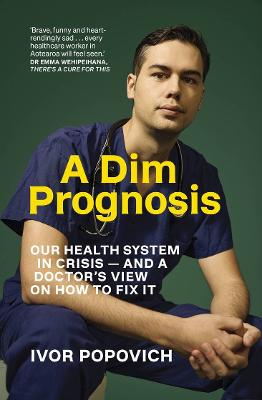Review: A Dim Prognosis, by Ivor Popovich
'an unflinchingly honest critique of a New Zealand health system that is at risk of implosion...'
There is a long tradition of physician writers, such as St Luke of the canonical gospels, poet John Keats, and short story writer Anton Chekhov.
A Dim Prognosis by newly minted author Dr Ivor Popovich is a welcome addition to this pantheon of literature. It is an unflinchingly honest critique of a New Zealand health system that is at risk of implosion. Most of us are aware that our hospitals are too full, that occasionally patients leave an emergency department because they’ve waited too long only to die at home, that general practice is pathetically underfunded. What Dr Popovich, an intensive care unit (ICU) trainee, also delivers are some excellent stories. Stories stick with readers, better than facts alone, and his stories neatly illustrate the many problems plaguing our health system. This book has pathos, humour, a collection of compelling medical vignettes narrated with empathy, and even a prescription for change.
His writing is fluid; at times chatty and amusing, a drip-feed of banter between medics that belies the exhaustion they frequently feel (describing the way the night registrar sprints from the room in relief, leaving Ivor holding the on-call pager: ‘He shot out of there like the Roadrunner. Did an AMF-YOYO. Adios, Mother-F*, you’re on your own’).
Ivor relives his own trajectory from a bumbling medical student who accidentally injects his own finger with Vitamin K, to the proficient near-consultant he is now. He acknowledges that diagnosis is an art form shot through with shades of grey, that fancy, expensive machines are not always right, that their information needs to be interpreted clinically. He recognises that inside all of us, even the nicest, most patient people, there is a dickhead waiting to come out. Reach your limit of energy and time, and out said dickhead pops.
The opening story is of the Whakaari White Island disaster. It’s a fascinating, sad read from a frontline medical person. On 9th December, 2019, this stratovolcano in the Bay of Plenty erupted. 47 people were on the island at the time. 22 died; the remaining 25 suffered extensive injuries and needed prolonged care in various ICUs. Ivor starts night shift at Middlemore Hospital and is greeted with a war zone. Patients, transferred from regional hospitals, have no name, no face. Under their dressings, they are covered in volcanic ash - gloves disintegrate on contact, and soon the team realises the burnt flesh is acting as a reservoir of toxic hydrofluoric acid. Ivor inserts central line after central line, charts fluids, spends hours trawling through paper notes from other hospitals. This last job should take 15 minutes, but because New Zealand does not have a unified nation-wide electronic records system, it consumes valuable hours instead.
The systemic problems Dr Popovich reels off are familiar. Bullying in the medical hierarchy is rife. When a med student, a Chinese Kiwi, leans too close in theatre, the surgical professor shouts, ‘Get any closer and I’ll send you right back to the takeaway store!’ I recall being bullied by a medical registrar. I burned with shame, and my ability to learn anything under her was ruined. Years later, when I ran into her again, I flinched in fear. Some specialties limit trainees, despite an urgent need for more specialists. The keys to these clubs are closely guarded, perhaps for less than altruistic reasons. We need better funding for primary care, better housing, better community nutrition; prevention is more cost-effective than expensive cures. We also need better IT services and stronger incentives for medics to not go overseas. A rapidly ageing population, the lucrative nature of private practice (robbing Peter to pay Paul; where else do private doctors come from, if not from the public sector?), and a Frankensteinish approach to improvements - a patch here and there, rather than a comprehensive, future-oriented overhaul - continue to burden us.
This book is full of vividly recounted stories; a real medical page-turner. Perhaps any government that truly wants to improve our health system would do well to seek input from Dr Popovich and his ilk. First step: read this book.
